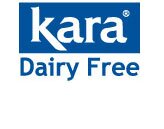|
|
 |
|
 |
|||||
| Nutrition & Diets | ||||||||
|
|
|
Kara Dairy Free is a versatile and palatable dairy free alternative to milk and would be suitable if you need a dairy free diet for cow’s milk protein intolerance or lactose intolerance. Because Kara Dairy Free is free from soya it is also useful where there is soya intolerance. Being free of animal products it is also suitable for Vegans and Vegetarians. It is not suitable as a sole source of nutrition for infants under 12 months of age as, like cow’s milk, it is not nutritionally complete. There is no evidence to suggest that those with nut allergy should avoid Kara Dairy Free, as coconuts are a fruit and not a nut. |
||||||
 |
||||||||
| Calcium Enriched Kara Dairy Free provides the same level of calcium as semi-skimmed milk. 250ml of Kara Dairy Free provides 37.5% of an adults Recommended Nutrient Intake of calcium. |
||||||||
|
Food Allergy Diets Other Diets Fat Reduced & Low Calorie Diets Kara Dairy Free is lower in energy or kilo calories than skimmed and semi-skimmed milk, so is a useful alternative milk for those watching their weight. Protein Restricted Diets |
||||||||
 |
||||||||
|
Copyright©First Grade International Ltd
|
||||||||


